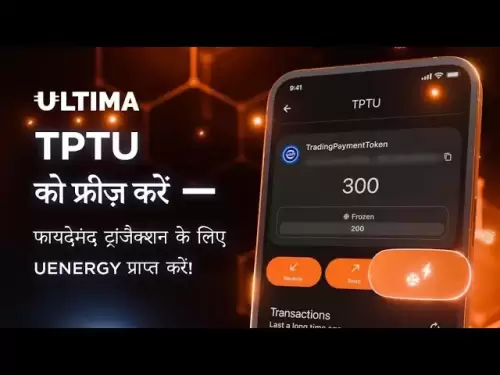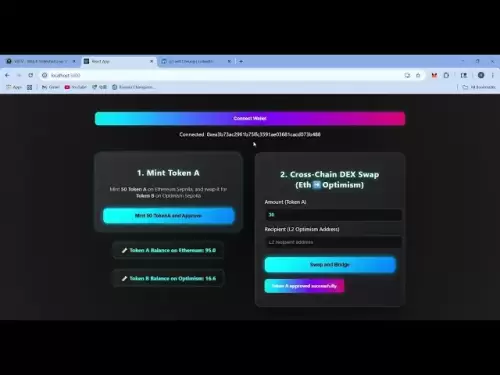-
 Bitcoin
Bitcoin $109,459.7682
2.44% -
 Ethereum
Ethereum $2,598.6052
6.29% -
 Tether USDt
Tether USDt $1.0003
0.00% -
 XRP
XRP $2.2734
3.95% -
 BNB
BNB $661.4886
1.58% -
 Solana
Solana $155.4825
4.35% -
 USDC
USDC $0.9999
-0.02% -
 TRON
TRON $0.2838
1.04% -
 Dogecoin
Dogecoin $0.1740
8.25% -
 Cardano
Cardano $0.6047
9.04% -
 Hyperliquid
Hyperliquid $40.2302
6.50% -
 Sui
Sui $2.9863
10.05% -
 Bitcoin Cash
Bitcoin Cash $509.5786
0.60% -
 Chainlink
Chainlink $13.8156
6.03% -
 UNUS SED LEO
UNUS SED LEO $9.0142
0.69% -
 Avalanche
Avalanche $19.0337
8.68% -
 Stellar
Stellar $0.2438
5.17% -
 Toncoin
Toncoin $2.9012
3.59% -
 Shiba Inu
Shiba Inu $0.0...01210
6.20% -
 Litecoin
Litecoin $90.0882
7.05% -
 Hedera
Hedera $0.1597
8.53% -
 Monero
Monero $326.3340
2.88% -
 Polkadot
Polkadot $3.6365
9.32% -
 Bitget Token
Bitget Token $4.6162
2.72% -
 Dai
Dai $1.0001
0.00% -
 Ethena USDe
Ethena USDe $1.0002
-0.01% -
 Uniswap
Uniswap $7.6403
10.47% -
 Pepe
Pepe $0.0...01060
12.03% -
 Aave
Aave $281.3664
7.56% -
 Pi
Pi $0.4992
1.76%
How to prevent Ethereum wallets from being hacked?
Safeguarding your Ethereum requires strong passwords, a reputable hardware or regularly updated software wallet, 2FA, phishing awareness, and regular audits & backups; avoid untrusted exchanges and carefully vet smart contracts.
Mar 16, 2025 at 10:50 am
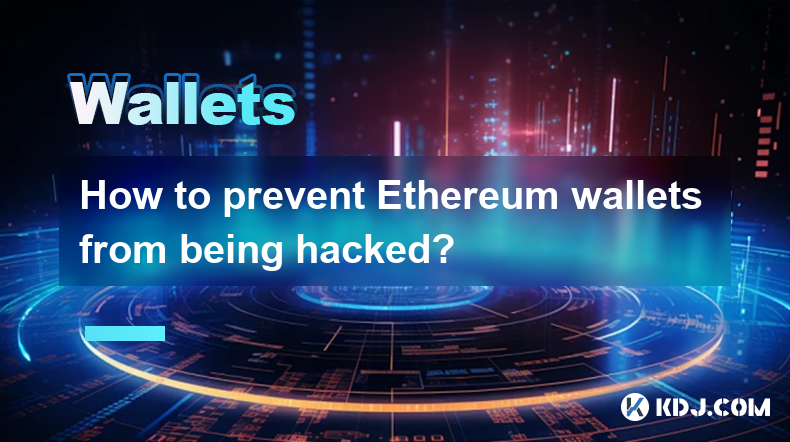
Key Points:
- Strong Password Practices: Utilizing complex, unique passwords and employing a password manager are crucial for enhanced security.
- Hardware Wallets: Hardware wallets offer superior security compared to software wallets by storing private keys offline.
- Software Wallet Security: Software wallets require careful selection, regular updates, and robust security measures to mitigate risks.
- Phishing Awareness: Recognizing and avoiding phishing attempts is paramount to prevent unauthorized access.
- Regular Audits and Backups: Regularly auditing your wallet and maintaining secure backups are essential preventative steps.
- Two-Factor Authentication (2FA): Enabling 2FA adds an extra layer of security, making unauthorized access significantly harder.
- Reputable Exchanges: Utilizing only reputable and established cryptocurrency exchanges minimizes the risk of scams and hacks.
- Smart Contract Security: Understanding the risks associated with smart contracts and exercising caution when interacting with them is crucial.
How to Prevent Ethereum Wallets from Being Hacked?
Ethereum, being a prominent blockchain, naturally attracts malicious actors. Securing your Ethereum wallet is paramount to protect your valuable digital assets. This requires a multi-faceted approach encompassing various security best practices.
1. Password Management: The Foundation of Security
A weak password is the easiest point of entry for hackers. Never reuse passwords across multiple accounts, including your Ethereum wallet. Use a strong password, incorporating uppercase and lowercase letters, numbers, and symbols. A password manager can help you generate and securely store complex passwords for various accounts.
2. Hardware Wallets: The Gold Standard
Hardware wallets, like Ledger and Trezor, offer the highest level of security. They store your private keys offline, making them virtually inaccessible to hackers even if your computer is compromised. This is considered the most secure method of storing your Ethereum.
3. Software Wallet Security: A Balanced Approach
Software wallets, while convenient, require extra caution. Choose reputable wallets with a proven track record and strong security features. Regularly update your wallet software to patch security vulnerabilities. Avoid downloading wallets from untrusted sources.
4. Phishing: The Persistent Threat
Phishing attempts remain a significant threat. Be wary of unsolicited emails, messages, or websites requesting your private keys or seed phrases. Legitimate organizations will never ask for this information. Always verify the authenticity of any communication before taking action.
5. Regular Audits and Backups: A Proactive Strategy
Regularly audit your Ethereum wallet transactions to detect any unauthorized activity. Create multiple backups of your seed phrase and store them securely in different locations. Never store your seed phrase digitally, and consider using a physical, tamper-evident storage method.
6. Two-Factor Authentication (2FA): An Added Layer of Protection
Enable 2FA whenever possible on your exchange accounts and software wallets. This adds an extra layer of security, requiring a second verification method, such as a code from your phone, before allowing access. This significantly increases the difficulty for hackers.
7. Choosing Reputable Exchanges: Minimizing Risks
Only use established and reputable cryptocurrency exchanges. Research the exchange thoroughly before depositing any funds. Look for exchanges with robust security measures, such as cold storage for user funds and two-factor authentication. Avoid lesser-known exchanges with questionable security practices.
8. Smart Contract Security: Navigating the Risks
Smart contracts, while offering innovative possibilities, also present security risks. Thoroughly audit the code of any smart contract before interacting with it. Be wary of unfamiliar or poorly documented smart contracts, as they may contain vulnerabilities that could compromise your funds.
Common Questions and Answers:
Q: What is a seed phrase, and why is it so important?
A: A seed phrase is a list of words that acts as a key to access your cryptocurrency wallet. It's crucial because it allows you to recover your wallet if you lose access or your device is compromised. Never share your seed phrase with anyone, and keep it securely stored offline.
Q: How often should I update my software wallet?
A: Update your software wallet whenever a new version is released. Updates often include critical security patches that protect against newly discovered vulnerabilities. Check the wallet's official website or app store for updates.
Q: What should I do if I suspect my Ethereum wallet has been hacked?
A: Immediately change your passwords, disable any connected devices, and contact the support team of your wallet provider or exchange. Monitor your transactions closely and report any suspicious activity to the relevant authorities.
Q: Are hardware wallets completely unhackable?
A: While hardware wallets are significantly more secure than software wallets, they are not entirely unhackable. Physical attacks are possible, though unlikely. Always buy from reputable vendors and follow best practices for their use and storage.
Q: What are some signs of a phishing attempt?
A: Signs of a phishing attempt include suspicious emails or messages requesting personal information, links to unfamiliar websites, urgent requests for action, grammatical errors, and unexpected emails from seemingly legitimate sources. Always verify the sender's identity before clicking any links or providing personal information.
Q: Can I recover my Ethereum if I lose my seed phrase?
A: No. Your seed phrase is the only way to access your Ethereum. Losing it means you lose access to your funds permanently. This highlights the critical importance of securely storing your seed phrase.
Disclaimer:info@kdj.com
The information provided is not trading advice. kdj.com does not assume any responsibility for any investments made based on the information provided in this article. Cryptocurrencies are highly volatile and it is highly recommended that you invest with caution after thorough research!
If you believe that the content used on this website infringes your copyright, please contact us immediately (info@kdj.com) and we will delete it promptly.
- Coinbase's Crypto Conquest: The Liquifi Acquisition and the Token Revolution
- 2025-07-03 16:30:12
- Neo Pepe Coin: Can This Meme Coin Make Waves in the 2025 Crypto Market?
- 2025-07-03 16:50:12
- Toncoin, Dogecoin, and Shiba Inu: A Wild Ride in the Crypto Zoo
- 2025-07-03 16:30:12
- AllScale: Stablecoin Solutions Empowering Small Businesses – A New York Perspective
- 2025-07-03 16:35:12
- Neo Pepe Coin Presale: Is This Meme Coin a Serious Crypto Investment?
- 2025-07-03 17:10:11
- Memecoins to Buy in July 2025: Riding the Hype or Investing Wisely?
- 2025-07-03 17:10:11
Related knowledge

How to lock my Phantom wallet extension?
Jul 03,2025 at 11:14am
What Is the Phantom Wallet and Why Lock It?The Phantom wallet is a popular non-custodial cryptocurrency wallet designed for interacting with the Solana blockchain. Supporting both browser extensions and mobile apps, Phantom allows users to store, send, receive, and stake SOL tokens, as well as interact with decentralized applications (dApps). Securing y...

Does Phantom wallet offer two-factor authentication (2FA)?
Jul 03,2025 at 09:00am
Understanding Phantom Wallet and Its Security FeaturesPhantom wallet is a widely used non-custodial cryptocurrency wallet that supports the Solana blockchain. It allows users to store, send, receive, and interact with decentralized applications (dApps) seamlessly. As security is a top priority for any crypto wallet user, security features like two-facto...

What is "rent" on Solana and how does it affect my Phantom wallet?
Jul 02,2025 at 08:35pm
Understanding 'Rent' on SolanaIn the context of Solana, the term 'rent' refers to a storage fee that users pay for maintaining data on the blockchain. Unlike Ethereum, where storage costs are paid once via gas fees during contract deployment, Solana implements a recurring cost model to ensure efficient usage of network resources. This means that any acc...
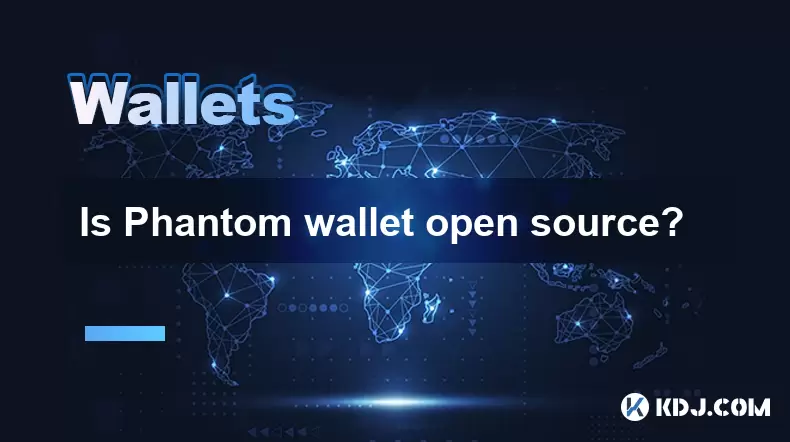
Is Phantom wallet open source?
Jul 03,2025 at 12:29am
What is Phantom Wallet?Phantom wallet is a non-custodial cryptocurrency wallet primarily designed for the Solana blockchain. It allows users to store, send, receive, and interact with decentralized applications (dApps) on the Solana network. The wallet is available as a browser extension and mobile application, offering a seamless experience for both be...
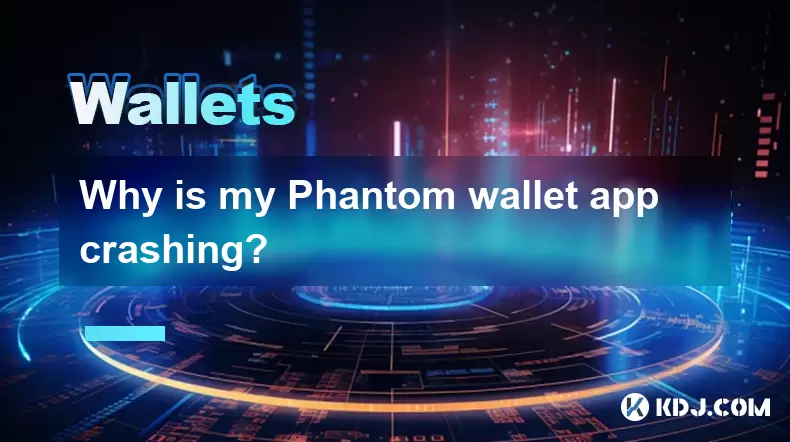
Why is my Phantom wallet app crashing?
Jul 02,2025 at 07:35pm
Understanding Phantom Wallet App CrashesIf you're experiencing issues with the Phantom wallet app crashing, you're not alone. Many users have reported similar problems, especially during high network activity or after recent updates. Phantom is a popular Solana-based wallet that allows users to store, send, and receive SOL tokens as well as interact wit...
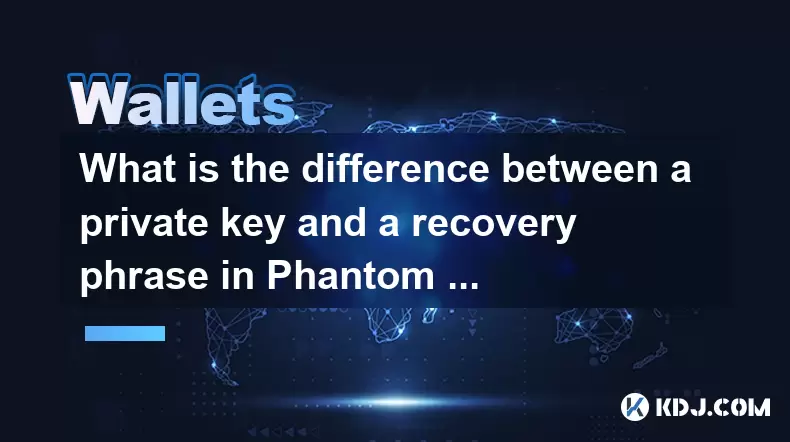
What is the difference between a private key and a recovery phrase in Phantom wallet?
Jul 02,2025 at 09:57am
Understanding the Basics of Phantom WalletPhantom wallet is a non-custodial digital wallet primarily used for interacting with the Solana blockchain. It allows users to store, send, and receive SOL tokens and other digital assets like NFTs. Non-custodial means that the user retains full control over their private keys and recovery phrases. Understanding...

How to lock my Phantom wallet extension?
Jul 03,2025 at 11:14am
What Is the Phantom Wallet and Why Lock It?The Phantom wallet is a popular non-custodial cryptocurrency wallet designed for interacting with the Solana blockchain. Supporting both browser extensions and mobile apps, Phantom allows users to store, send, receive, and stake SOL tokens, as well as interact with decentralized applications (dApps). Securing y...

Does Phantom wallet offer two-factor authentication (2FA)?
Jul 03,2025 at 09:00am
Understanding Phantom Wallet and Its Security FeaturesPhantom wallet is a widely used non-custodial cryptocurrency wallet that supports the Solana blockchain. It allows users to store, send, receive, and interact with decentralized applications (dApps) seamlessly. As security is a top priority for any crypto wallet user, security features like two-facto...

What is "rent" on Solana and how does it affect my Phantom wallet?
Jul 02,2025 at 08:35pm
Understanding 'Rent' on SolanaIn the context of Solana, the term 'rent' refers to a storage fee that users pay for maintaining data on the blockchain. Unlike Ethereum, where storage costs are paid once via gas fees during contract deployment, Solana implements a recurring cost model to ensure efficient usage of network resources. This means that any acc...

Is Phantom wallet open source?
Jul 03,2025 at 12:29am
What is Phantom Wallet?Phantom wallet is a non-custodial cryptocurrency wallet primarily designed for the Solana blockchain. It allows users to store, send, receive, and interact with decentralized applications (dApps) on the Solana network. The wallet is available as a browser extension and mobile application, offering a seamless experience for both be...

Why is my Phantom wallet app crashing?
Jul 02,2025 at 07:35pm
Understanding Phantom Wallet App CrashesIf you're experiencing issues with the Phantom wallet app crashing, you're not alone. Many users have reported similar problems, especially during high network activity or after recent updates. Phantom is a popular Solana-based wallet that allows users to store, send, and receive SOL tokens as well as interact wit...

What is the difference between a private key and a recovery phrase in Phantom wallet?
Jul 02,2025 at 09:57am
Understanding the Basics of Phantom WalletPhantom wallet is a non-custodial digital wallet primarily used for interacting with the Solana blockchain. It allows users to store, send, and receive SOL tokens and other digital assets like NFTs. Non-custodial means that the user retains full control over their private keys and recovery phrases. Understanding...
See all articles





















